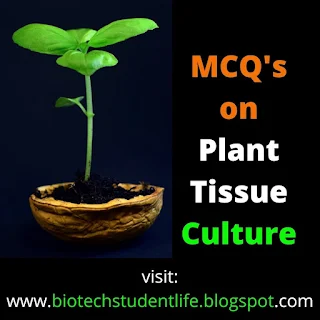Hello friends, in today's article, we see the MCQ on Plant Tissue Culture. in this you get the basic MCQ, that helps to crack the entrance exam like, CSIR-NET also.
so let's start
MCQ's on Plant Tissue Culture
1.
The growth of
plant tissues in artificial media is called___________
a) Gene expression
b) Transgenesis
c) Plant tissue culture
d) Cell hybridization
2.
A plant
cell is a prokaryotic cell.
a) True
b) False
3.
Which of the
following is NOT the feature of plant cells?
a) Presence of centrioles
b) The cell wall outside the cell membrane
c) Cell-cell communication through plasmodesmata
d) Consists of plastids
4.
Name the term
given to the ability of single cells to divide and produce all the
differentiated cell in the organism?
a) Unipotent
b) Pluripotent
c) Multipotent
d) Totipotency
5.
Out of the
following, which one is NOT the basic component of culture media used for plant
cultivation?
a) Complex mixture of salts
b) Amino acids
c) Serum albumin
d) Sugar/ sucrose
6.
Mark the
INCORRECT statement about agar, a gelling agent in plant tissue culture medium?
a) Not digested by plant enzymes
b) It does not use in
microprapogation work
c) It does not react with media constituents
d) Remain stable at incubation temperature
7.
Which of the
following is NOT a plant growth regulator?
a) Auxin
b) Cytokinins
c) Abcisic acid
d) Polyphenols
8.
Which of the
following is the main effect of cytokines in the tissue culture system?
a) Adventitious shoot
formation
b) Induction of somatic embryos
c) Adventitious root formation
d) Shoot elongation
9.
Which one of
them is NOT the main effect of polyamines in the tissue culture system?
a) Promotion of tuber and
bulb formation
b) Adventitious root formation
c) Promotion of shoot formation
d) Somatic embryogenesis
10. Which of the following plant hormone control fruit
ripening?
a) Ethylene
b) Auxin
c) Gibbrellins
d) Abscisis acid
11. What is plant tissue culture?
a) The technique of in
vitro maintaining and growing cells
b) The technique of in vivo growing cells
c) The technique of growing plants in gardens
d) The technique of cutting plants
12. Tissue culture technique was first practised by
_____________
a) White
b) Haberlandt
c) Halperin
d) Skoog
13. Which of the following scientist was not responsible
for developing somatic hybrids?
a) Steward
b) Halperin
c) Wetherell
d) Skoog
14. What is an explant?
a) A part of plant grown under soil
b) Any part of a plant
taken out and grown in a test tube
c) A specific part of a plant grown in a test tube
d) Leaves grew under test tube
15. The capacity to generate a whole new plant
from any cell is known as micropropagation.
a) False
b) True
16. Essential requirement of an artificial medium in
which explant is being regenerated is __________
a) the medium should have a sulphur source
b) the medium should have very low carbon concentration
c) the medium must provide
a carbon source
d) the medium must provide a nitrogen donor
17. What are somaclones?
a) Plants chemically identical to the original plant
b) Plants morphologically identical to the original plant
c) Plants anatomically identical to the original plant
d) Plants genetically
identical to the original plant
18. Which of the following plant part is free from the
attack of the virus?
a) Stem
b) Root
c) Meristem
d) Leaves
19. Which of the following plant’s meristem has not been
successfully cultured?
a) Banana
b) Apple
c) Sugarcane
d) Potato
20. What is protoplast?
a) Cell wall + Plasma membrane
b) Plant cell – cell wall
c) Cytoplasm + cell wall
d) Plasma membrane – cytoplasm
21. Pomato is a somatic hybrid.
a) True
b) False
22. What are somatic hybrids?
a) Hybrid protoplasts
b) Protoplasts
c) Fused plasmids
d) Fused Chloroplast
23. Which of the following is not related to embryo
culture?
a) Growth of embryos on culture medium
b) Developing seedlings
c) Multiplication of rare plants
d) Making virus-free
plants
24. Which of the following is not an application of
tissue culture?
a) Rapid Clonal Propagation
b) Somaclonal Variations
c) Embryo rescue
d) Transgenic plants
25. Buy books on Plant Tissue Culture, on the following link


Comments
Post a Comment
problem related comment